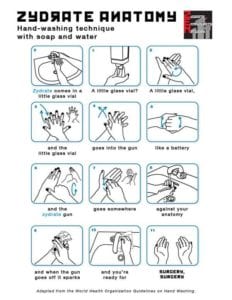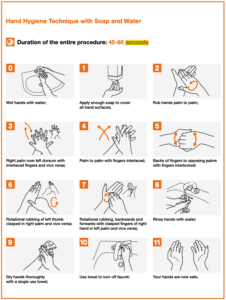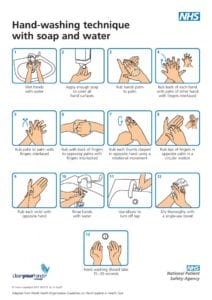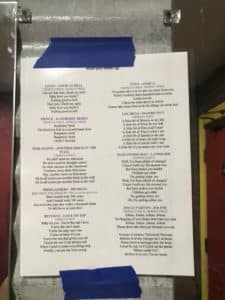Copyright, Fair Use and Hand-Washing Memes
Counting to 20 the easy way...

The threat of the novel coronavirus (COVID-19) currently has the world in its grips. Across the planet, schools are closing, gatherings are being canceled and whole countries are both bracing for an epidemic while working to prevent one.
However, in the midst of all the uncertainty, people work hard to find creative ways to both entertain and humor themselves. In this age of #socialdistancing, one of the most powerful tools has been meme and, to that end, the hand-washing meme has been one of the most popular.
The meme is not just an interesting example of how memes can be used to relay important information and alter societal behavior/thinking, but also on copyright and fair use. After all, the entire premise of the meme involves taking lyrics from well-known songs, pairing them with artwork created by the NHS and distributing the finished product broadly on the internet.
Fortunately, there’s no reason to worry. There’s no copyright hammer getting ready to come down on this meme. Not only would any rightsholder be absolutely foolish for doing so, but the meme format itself is almost certainly protected under fair use.
However, it’s worth taking a moment to look at the history of the meme and see why it is so protected.
A Brief History of the Hand-Washing Meme
The handwashing meme actually began as guidelines from the Worth Health Organization (WHO) on how to properly wash one’s hands. Those guidelines provided a now-well-known step-by-step series of instructions for properly washing your hands.
Note: Though the latest publication was in 2009, the guidelines go back a very long way with the NHS guidelines (seen later) saying they were adapted from the WHO ones.
Though it’s unclear when and where these guidelines made the jump to being set to music, the UK’s National Health Service (NHS) had been recommending washing your hands to the tune of Happy Birthday to You since at least 2017.
As for t=the original image that’s most commonly used in the meme, it was also created by the NHS and dates back to 2007. However, as you’ll see, the image, much like the WHO version, only contains instructions, not lyrics.
The combination of the lyrics came from various health agencies recommending that people sing a song to themselves as they wash their hands, noting that finding a good lyric could help ensure they wash their hands for the full 15-30 seconds that’s recommended.
Then, according to Know Your Meme, it was Twitter user @Neoncloth that brought the meme to life. On March 8, 2020 he created the site WashYourLyrics, which allowed users to put the lyrics to their favorite (or least favorite) songs into a version of the meme.
According to the original tweet, the site itself took less than 24 hours to create. However, it did hit some roadblocks as it went viral causing both Digital Ocean and Cloudflare to step up and provide free additional services to it so it could stay alive.
That site would ultimately be the genesis of the hand-washing meme as we know it. With the site generating some 3.6 million posters in the first week alone. That’s not counting the various other hand-washing meme generation websites that have popped up and those that simply make their own.
Though it’s virality has died down some, it continues to be a very popular meme as people find ways to both find humor in and actively fight the spread of COVID-19.
What About the Copyright?
The copyright of the meme is fairly interesting. As most will note, very little in the meme is original. The format of the meme, at least the original one, is from the NHS and the lyrics are going to be owned by a variety of music publishers and songwriters.
The first part of that might seem strange to those in the United States. Here, works by the federal government are automatically placed into the public domain. However, in the UK, such works enjoy protection as crown copyright. In fact, the original image even has a copyright notice indicating as such.
However, crown copyright is extremely limited and, according to The National Archives, which manages those rights on behalf of the crown, the default license for such content is the Open Government License. It allows people to copy, publish and distribute such works, including adaptations, so long as they identify the source of it. There are limitations for certain kinds of works, but none that are relevant to this document.
Since the original clearly acknowledges both the NHS, there’s no likely issue there.
Note: The WHO also technically has the copyright on their version but, since facts can’t be copyrighted and the NHS is responsible for the creative elements of their version, it seems unlikely the WHO would have any say (not that they would ever want to).
As for the lyrics, this is where fair use comes in. Since the meme is highly transformative, only uses part of the song in most cases, does not harm the potential market for the lyrics and is also for public good (rather than commercialization), it seems likely that the use of the lyrics would be ruled fair use.
To be clear, we have seen some really insane fair use rulings in the past, but it’s highly unlikely that the hand-washing meme would be ruled anything but fair use. That’s assuming, of course, that any rightsholder would want to claim infringement (none have indicated anything of the sort at this time).
The argument is further bolstered by the fact that Wash Your Lyrics uses the Genius API to pull the lyrics down. Genius, despite having something of a rocky past, is fully licensed today.
So, when it’s all said and done, the hand-washing meme doesn’t really have a copyright problem in front of it. At least not one I can see. This is in spite of the fact that it has almost no original content, but instead combines two separate elements in a new and useful way.
Bottom Line
So please, feel free to make your hand-washing memes. Maybe the format will play a small role in curbing the virus or help prevent a few people from falling ill. If so, that is great.
But even if there were no open government license and fair use weren’t a factor, it still seems unlikely that anyone would speak out against it. Despite all of the talk about a “War on Memes” there’s never really been one. DMCA takedown notices and lawsuits over memes have been extremely rare and that includes memes with lyrics. Rightsholders have had ways to fight memes since before they were a thing and almost none have done so.
And why would they? Not only is the infringement of a meme generally pretty dubious, it causes little harm to the rightsholder and may even help them. Usually, when we see copyright being used against memes it’s not about actual infringement, but about people who are trying to silence criticism or out of political opposition. Those cases usually have little impact on the meme long-term.
A rightsholder would be absolutely mad to try and fight this particular me. Even setting aside the potential public good, it can increase demand for the song and its use is non-commercial.
Though, usually, when people say “infringement is free advertising” they’re lying. Here, it’s not infringement and it IS free advertising.
Things could change if a corporation attempts to tie themselves to a song through this meme, but most of us have little to worry about other than how long we wash our hands.
Special Thanks: Thank you to @Future_of_Music for the great suggestion for this topic.
Want to Reuse or Republish this Content?
If you want to feature this article in your site, classroom or elsewhere, just let us know! We usually grant permission within 24 hours.



